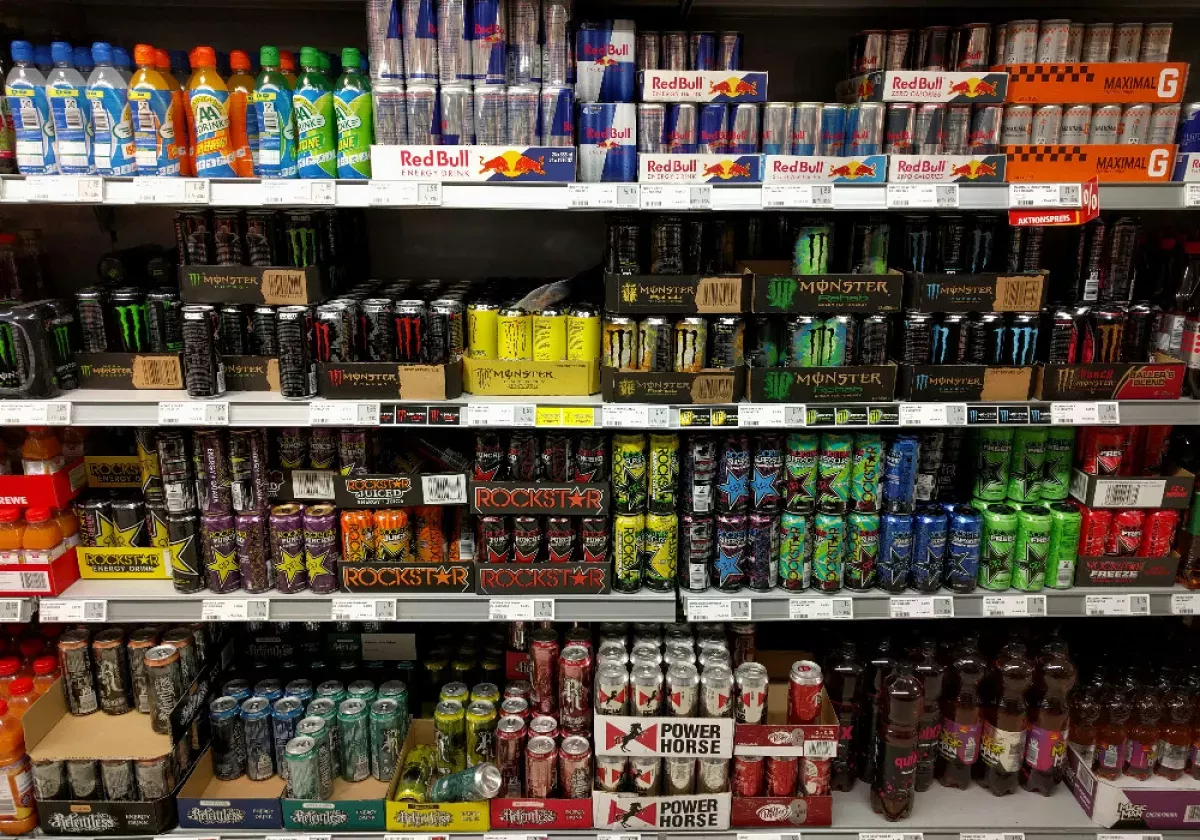Energy drinks are beverages marketed to provide mental and physical stimulation, primarily through stimulants like caffeine. They may be carbonated and often contain sugar or other sweeteners, along with herbal extracts and various other ingredients. These drinks are classified as functional beverages due to their purported performance-enhancing effects.
1949: Dr. Enuf Creation
In 1949, Dr. Enuf, a soft drink containing caffeine and B vitamins and described as an "energy building" drink, was created in the United States.
1962: Lipovitan D Production
In 1962, Taisho Pharmaceutical in Japan produced Lipovitan D, a herbal "energizing tonic" sold in minibar-sized bottles, originally marketed towards truck drivers and factory workers.
1997: Red Bull Banned in Denmark
In 1997, Denmark banned the sale of Red Bull due to concerns over added ingredients such as B vitamins, inositol, glucuronolactone, and taurine, as well as high caffeine content.
1997: Red Bull Introduction in the US
In 1997, Red Bull was introduced in the US and became the dominant brand.
2000: India Regulates Energy Drink Ingredients
In 2000, the Food Safety and Standards Authority of India (FSSAI) regulated the manufacturing, packaging, labeling, and sale of energy drinks. FSSAI limited taurine to 2000 mg/day, D-glucuronic-Y-lactone to 1200 mg/day, Inositol to 100 mg/day, and pantothenic acid to 10 mg/day.
2001: UK Committee on Toxicity Investigates Red Bull
In 2001, the UK Committee on Toxicity investigated Red Bull, finding it safe but issuing a warning against its consumption by children and pregnant women.
2002: Monster Energy Introduction
In 2002, Hansen Natural Company introduced Monster Energy drink.
2004: 5-Hour Energy Release
In 2004, 5-Hour Energy, an energy shot product, was first released onto the market in the US.
2004: Energy Drink Ban Challenged in Europe
In 2004, a ban on energy drinks was challenged in the European Court of Justice and subsequently lifted.
2005: Red Bull Market Share
By 2005, Red Bull achieved a market share of approximately 47% in the US.
2007: Energy Drink Powders and Tablets Introduced
In 2007, energy drink powders and effervescent tablets were introduced, allowing users to create energy drinks by adding them to water.
May 2009: Red Bull Legalized in Norway
In May 2009, it became legal to sell Red Bull in Norway as the ban was in conflict with the European Economic Area's laws on free competition.
2009: Colombia Prohibits Sale to Minors
In 2009, Colombia, under the Ministry of Social Protection, prohibited the sale and commercialization of energy drinks to minors under the age of 14.
2009: Denmark Legalizes Energy Drinks
In 2009, Denmark raised the caffeine limit to 320 mg/L and approved taurine and glucuronolactone as ingredients, making energy drinks legal again.
2009: School Requests Shops to Refrain from Selling Energy Drinks
In 2009, a school in Hove, England, requested that local shops refrain from selling energy drinks to students due to their detrimental impact on concentration. The local Tesco supermarket displayed posters asking students not to purchase energy drinks.
2010: Caffeinated Alcoholic Drinks Banned in the US
In 2010, caffeinated alcoholic drinks were banned in the US, after American products like Four Loko and Joose had originally combined caffeine and alcohol.
August 2012: "Energy Drink" Listed in Dictionary
On August 14, 2012, the term "energy drink" was officially listed in Merriam-Webster's Collegiate Dictionary for the first time.
November 2012: Chechnya Considers Energy Drink Ban
In November 2012, President Ramzan Kadyrov of Chechnya (Russian Federation) ordered his government to develop a bill banning the sale of energy drinks, citing concerns over their impact on society.
2013: Energy Drinks Rebranding in the US
In 2013, some energy drinks, including Monster Energy and Rockstar Energy, were reported to be rebranding their products as drinks rather than dietary supplements in the United States.
March 2014: Consumer Health Analyst Explanation
In March 2014, a consumer health analyst explained that "Energy shots took off because of energy drinks. If you're a white collar worker, you're not necessarily willing to down a big Monster energy drink, but you may drink an energy shot."
November 2014: Lithuania Bans Sale to Minors
In November 2014, Lithuania became the first country in the EU to ban the selling of energy drinks to anyone under the age of 18 due to their popularity among minors.
June 2016: Latvia Bans Sale to Minors
In June 2016, Latvia banned the sale of energy drinks containing caffeine or stimulants like taurine and guarana to people under the age of 18.
2017: Global Energy Drink Sales and Reformulation
In 2017, global energy drink sales reached approximately 44 billion euros. Manufacturers also began modifying energy drink compositions for reduced or no sugar, lower calories and caffeine, "clean" labels, exotic flavors, and mood-altering ingredients.
January 2018: UK Supermarkets Ban Energy Drink Sales to Minors
In January 2018, many United Kingdom supermarkets banned the sale of energy drinks containing more than 150 mg of caffeine per liter to people under 16 years old.
January 2019: Uzbekistan Restricts Energy Drinks
In January 2019, President Shavkat Mirziyoyev of Uzbekistan signed a law that imposes a number of restrictions on energy drinks. This includes prohibiting the sale of energy drinks to persons under the age of 18 and restricting advertising.
2019: Norwegian Food Safety Authority Recommendation
In 2019, the Norwegian Food Safety Authority initially recommended an age limit on the sale of energy drinks.
2019: UK Government Planned Ban
In 2019, the UK government announced plans to ban all sales of energy drinks to minors.
2020: Energy Drink Market Share
In 2020, Red Bull held the largest global market share among energy drinks at 43%, followed by Monster Energy at 39%, Rockstar Energy at 10%, and Amp and NOS at 3% each.
2022: UK Scraps Energy Drink Ban Plans
In 2022, plans for a UK ban on energy drink sales to minors were reported to have been scrapped by Health Secretary Sajid Javid.
February 2023: Bridgetown Energy Drink Ban
As of February 2023, Bridgetown in Western Australia became the first place in Australia to ban the sale of energy drinks to persons under 18 years old for four months.
January 2024: Prohibition of Energy Drink Purchase
Since 1 January 2024, the purchase of energy drinks has been prohibited for individuals under the age of 18.
2024: Denmark Advises Against Energy Drink Consumption for Children
As of 2024, the Danish Veterinary and Food Administration advises against energy drink consumption for children, with limited consumption for children between 15 and 17 years old.
2024: Norwegian Consumer Council Call for Age Limit
In 2024 the Norwegian Consumer Council called for an age limit after seeing energy drink sales increase dramatically since 2019. The Food Safety Authority disagrees, stating it is hard to ascertain if children, specifically, are drinking more energy drinks.
Mentioned in this timeline
India officially the Republic of India is a South Asian...
Colombia officially the Republic of Colombia is a country located...
Japan is an East Asian island country situated in the...
Australia officially the Commonwealth of Australia encompasses the Australian mainland...
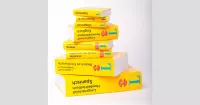
A dictionary is a reference work containing lexemes from one...
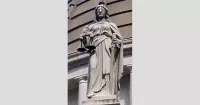
Justice in its broadest sense is the concept of treating...
Trending
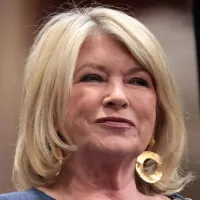
1 month ago Martha Stewart's Holiday Collection Returns for 2025: Decor and Dining Favorites!
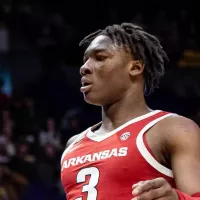
6 months ago Adou Thiero: From Arkansas Project to NBA Draft Prospect in 2025

1 month ago Jason Bateman's Sister Justine; Amy Poehler's SNL Chimpanzee Scare Detailed.
7 months ago Savannah Guthrie and Craig Melvin Temporarily Replaced on Today Show: Here's Why
26 days ago SeaWorld and Busch Gardens Face DOJ Probe Over Walker Ban Policy.
22 days ago Marcus Freeman: Notre Dame coach considered for Giants head coaching vacancy in NFL.
Popular

XXXTentacion born Jahseh Dwayne Ricardo Onfroy was a controversial yet...
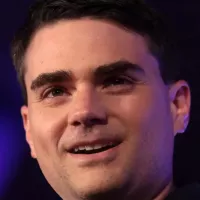
Ben Shapiro is a prominent American conservative political commentator media...

Candace Owens is an American conservative political commentator and author...

William Franklin Graham III commonly known as Franklin Graham is...
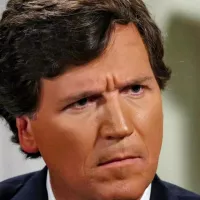
Tucker Carlson is an American conservative political commentator known for...
The Kennedy Center Honors are annual awards recognizing individuals and...
